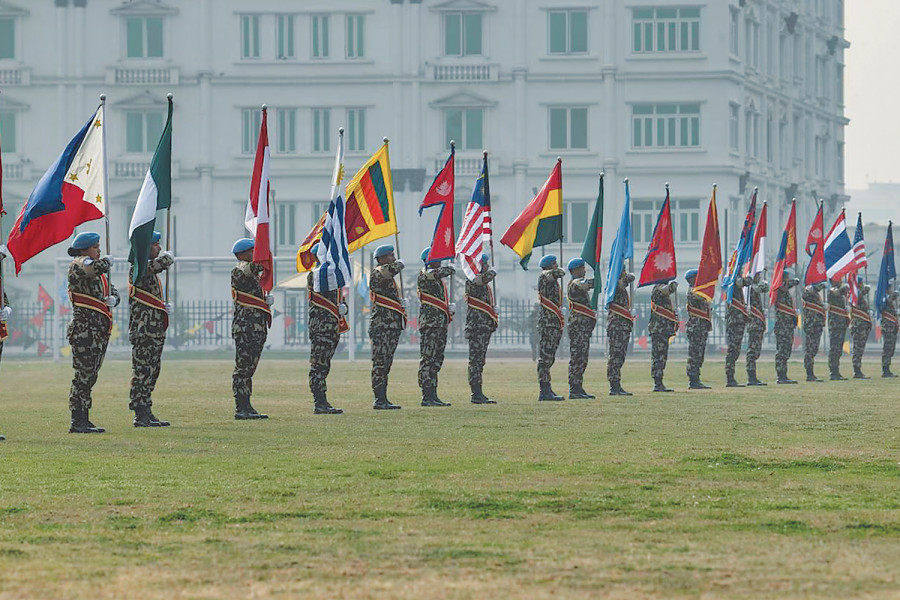National
Military diplomacy in focus amid mega peacekeeping exercise
As US Indo-Pacific commander arrives, high-level Chinese military delegation is due to visit Kathmandu in March.
Anil Giri
With powerful nations sending high-level defence delegations to Kathmandu, Nepal’s military diplomacy is in full swing.
Nepal Army is hosting the fourth edition of Exercise Shanti Prayas, which brings more than 1,100 military personnel from 17 nations. Admiral John Aquilino, who leads the United States Indo-Pacific Command, arrived in Kathmandu via New Delhi on Saturday to observe the exercise sponsored by the Nepali and US armies.
Shanti Prayas is a multinational peacekeeping exercise hosted rotationally by the Nepal Army and the US Indo-Pacific Command.
Observers say having good military-to-military relations contributes to the improvement of overall bilateral and multilateral relations between Nepal and respective countries.
Adm Aquilio is scheduled to visit the Birendra Peace Operations Training Centre (BPOTC) in Panchkhal on Sunday, said Nepal Army spokesperson Brigadier General Krishna Prasad Bhandari. He is also scheduled to meet President Ramchandra Paudel, Prime Minister Pushpa Kamal Dahal, Deputy Prime Minister and Minister for Defence Purna Bahadur Khadka, Chief of the Army Staff General Prabhu Ram Sharma and senior government and military officials, on Monday, according to the sources.
In New Delhi, Aquilino addressed the Raisina Dialogue and held talks with the External Affairs Minister of India S Jaishankar, among other Indian officials. Jaishankar wrote about his meeting with the admiral on the social media platform X (formerly Twitter). The minister said that he had a good conversation with Aquilino on strategic affairs.
Prime Minister Dahal inaugurated the Exercise Shanti Prayas-IV on February 20. The event will continue till March 4. Rachel Schiller, the US deputy assistant secretary for programs and operations under the Bureau of Political-Military Affairs, attended during the opening ceremony.
Shanti Prayas—IV is designed to improve peacekeeping capabilities, strengthen military-to-military cooperation, and enhance the core peacekeeping competencies of all participants in accordance with the UN doctrines. The militaries of Nepal, the US, Australia, Bangladesh, Canada, Fiji, Ghana, India, Indonesia, Malaysia, Mongolia, Nigeria, Pakistan, the Philippines, South Korea, Sri Lanka, Thailand, Uruguay, and Vietnam are participating in the effort, according to the Nepal Army.
After the Shanti Prayas concludes, a high-level delegation led by a lieutenant general of the Chinese People’s Liberation Army is due to arrive in Kathmandu. The agenda of the March visit is yet to be fixed, according to sources at the Ministry of Defence.
There are some pending issues with China like military procurement, installation of an ammunition plant for the Nepal Army, another joint military exercise, training for Nepali Army officials, and military-to-military cooperation, sources privy to the developments said.
“The Chinese side has informed us that the PLA delegation will be led by a lieutenant general. The two sides are finalising agendas and issues,” said a defence official informed on the matter.
Chinese Major General Yue Ande of the Tibet Military Command of the PLA visited Kathmandu in August last year. In talks held with Gen Sharma, the two sides discussed holding the pending joint military drills, among other issues.
When Nepal Army chief Sharma visited China in October-November last year to attend the Beijing-Xiangshan Forum, he held talks with Chief of Staff Gen Liu Zhenli of the Central Military Commission (CMC) of the Chinese Army and visited Chinese Army’s different units and training centres in Xi’an, Shanghai and Guangzhou.
However, Nepal Army spokesperson Brig Gen Bhandari said that he has no information about the PLA delegation’s Nepal visit.
Moreover, several Indian Army officials and delegations have also visited Kathmandu and held talks with General Sharma and other senior military and government officials.
In the context of the Indo-Pacific, Shanti Prayas is a remarkable event at a time when regional bodies like SAARC have stalled, said retired Maj Gen Purna Silwal. The participation of India and other democratic countries in this particular multilateral military exercise is significant.
“In terms of participation, the event this year is the biggest of its kind in Nepal. As the army is the country’s only stable institution, all major and middle powers want to have good relations with it,” said Silwal. “If the relations between the armies are good, other relations will automatically improve. This will further stabilise and cement bilateral ties.”
Nepal Army is capable of handling geopolitical rivalry, and such military exercises and arrivals of individual military delegations from various countries are not targeted against any nation, Silwal added.
After Nepal became the highest troops contributing country to UN peacekeeping, this is another milestone for us, said Silwal. “This achievement will boost our confidence.”




 16.12°C Kathmandu
16.12°C Kathmandu















